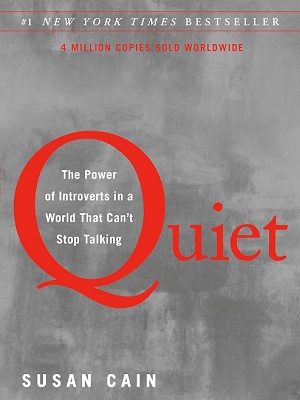Quiet: The Power of Introverts in a World That Can’t Stop Talking by Susan Cain is a profound exploration of the strengths and qualities of introverts, a group often overlooked in a world that prizes extroversion. Cain’s work sheds light on the value that introverts bring to various aspects of life, including work, relationships, and creativity. Below are the key lessons from the book:

Read: One Bold Move a Day
1. Understanding Introversion and Extroversion
- Lesson: Introversion and extroversion are not merely personality traits but are deeply rooted in our biology and brain chemistry. Introverts typically respond more sensitively to external stimuli, which makes them prefer quieter, low-key environments. Understanding this distinction helps in recognizing the unique strengths that introverts bring to the table, such as deep thinking and the ability to focus intensely on tasks.
2. The Misconceptions About Introverts
- Lesson: Society often misunderstands introverts, labeling them as shy, antisocial, or less capable leaders. Cain clarifies that introverts are not necessarily shy; they simply prefer smaller, more meaningful interactions over large social gatherings. Introverts are also fully capable of leading and can often excel as leaders because of their thoughtful, measured approaches.
3. The Power of Solitude
- Lesson: Solitude is crucial for introverts, who often do their best work when they are alone. In solitude, introverts can reflect, think deeply, and generate creative ideas. Cain argues that this is not just a preference but a necessity for introverts to recharge and maintain their well-being.
4. Introverts as Leaders
- Lesson: Introverts can be highly effective leaders due to their ability to listen carefully, consider all perspectives, and make well-thought-out decisions. Cain dispels the myth that only extroverts can lead, highlighting that introverted leaders like Warren Buffett and Bill Gates have made significant impacts through their quiet but powerful leadership styles.
5. Deep Work and Focus
- Lesson: Introverts excel in deep work—tasks that require sustained focus and concentration. Cain points out that introverts are often able to work independently on complex problems for extended periods, making them particularly valuable in fields that require intense focus, such as research, writing, and art.
6. The Role of Environment in Performance
- Lesson: The environment plays a significant role in how well introverts perform. Cain suggests that introverts are more productive in environments that allow for quiet and concentration, as opposed to open-plan offices or loud, bustling settings. Creating or seeking out environments that cater to these needs can help introverts thrive.
7. The Art of Listening
- Lesson: One of the greatest strengths of introverts is their ability to listen. Cain notes that introverts often listen more than they speak, which allows them to gather valuable information, understand others deeply, and build stronger relationships. This skill is especially important in leadership and collaborative work.
8. Introverts in Social Situations
- Lesson: While introverts may not seek out social situations as eagerly as extroverts, they can still thrive in them by focusing on quality over quantity. Cain advises introverts to embrace their preference for meaningful, one-on-one interactions rather than trying to conform to extroverted social norms.
9. Leveraging Introvert Strengths in the Workplace
- Lesson: Introverts should leverage their strengths, such as their ability to work independently, think critically, and focus deeply. Cain suggests that introverts can excel in careers that value these skills, such as research, writing, design, and any role that allows for thoughtful, solo work.
10. The Power of Preparation
- Lesson: Introverts often prefer to prepare thoroughly before engaging in activities, especially those that involve public speaking or group discussions. Cain emphasizes that this tendency to prepare can be a strength, leading to better performance and more thoughtful contributions.
11. Managing Energy Levels
- Lesson: Introverts need to manage their energy levels carefully because social interactions can be draining. Cain suggests that introverts plan their schedules to include time for solitude and rest, ensuring they remain energized and effective in both their personal and professional lives.
12. The Value of Writing for Introverts
- Lesson: Writing is a powerful tool for introverts, allowing them to express their thoughts and ideas clearly and thoughtfully. Cain highlights how introverts often prefer writing over speaking as it gives them the time to organize their thoughts and communicate more effectively.
13. Overcoming the Extrovert Ideal
- Lesson: Society often idolizes extroverted traits, known as the “Extrovert Ideal,” which can pressure introverts to conform to standards that don’t suit them. Cain encourages introverts to recognize their worth and to resist the pressure to change, emphasizing that their natural tendencies are just as valuable.
14. Collaboration Without Compromise
- Lesson: Introverts can collaborate effectively without compromising their need for quiet and focus. Cain suggests that introverts should seek out collaborative environments that allow for both group work and individual focus, ensuring they can contribute without feeling overwhelmed.
15. Cultivating Quiet Strength
- Lesson: Introverts possess a quiet strength that can be incredibly powerful. Cain encourages introverts to embrace their natural tendencies and to use their quiet demeanor as a source of strength, rather than seeing it as a weakness in a world that often celebrates loudness.
16. Introverts in Relationships
- Lesson: In relationships, introverts often bring depth, empathy, and a strong ability to listen. Cain explains that introverts can build strong, meaningful connections by being true to themselves and by valuing quality over quantity in their social lives.
17. Finding Your Place in the World
- Lesson: Introverts need to find environments and communities where they feel comfortable and valued. Cain advises introverts to seek out spaces that align with their preferences, whether in work, social life, or hobbies, to create a fulfilling life that honors their nature.
18. The Role of Parents and Educators
- Lesson: Parents and educators play a crucial role in nurturing introverted children. Cain argues that it’s important to recognize and respect a child’s introverted nature, allowing them the space to grow and develop in ways that feel natural to them, rather than forcing them into extroverted molds.
19. Balancing Introversion and Extroversion
- Lesson: While introverts should embrace their natural tendencies, Cain also suggests finding a balance between introversion and extroversion. There are times when introverts may need to step outside their comfort zones, and learning to do so without losing oneself is a valuable skill.
20. Redefining Success for Introverts
- Lesson: Success doesn’t have to look the same for introverts as it does for extroverts. Cain encourages introverts to redefine success on their own terms, focusing on their unique strengths and creating a life that feels true to who they are.
Conclusion
Susan Cain’s Quiet: The Power of Introverts in a World That Can’t Stop Talking is a powerful reminder that introverts have much to offer in a world that often values extroverted traits. By understanding and embracing their natural tendencies, introverts can thrive in their personal and professional lives. The book encourages both introverts and extroverts to appreciate the diversity of human personalities and to create spaces where everyone’s strengths can shine. These lessons not only provide valuable insights for introverts but also help extroverts understand the introverted perspective, fostering better communication and collaboration across different personality types.



